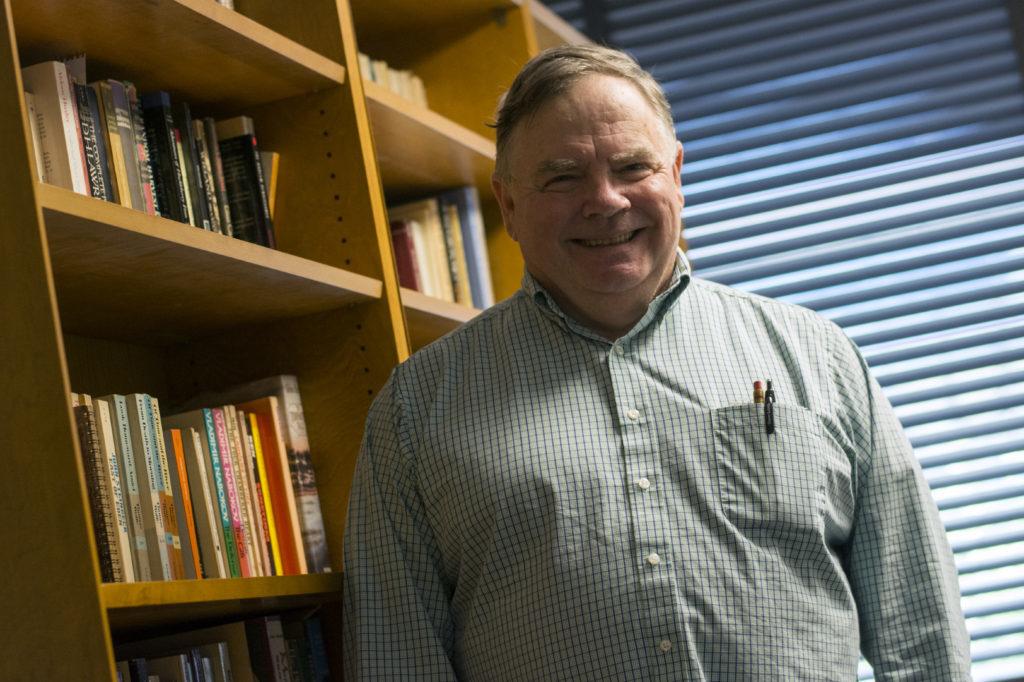English professor Robert Combs views his lectures on American drama as his own personal rehearsal in front of a “captive audience” of students. But this semester, the curtain will close on his bi-weekly performances as he retires after a nearly five-decade long career at GW.
Combs, who announced his retirement at the beginning of the semester, has taught at the University since 1971 focusing his career on American drama and short fiction from the 19th century to modern day. English faculty said they would lose a devoted professor, marked by his passion for the subject he spent his life teaching.
Combs’ interest in literature dates back to when he was a student at the University of Southern Mississippi in the 1960s. He said he chose the school to learn from a piano teacher who taught there, but quickly discovered his fascination with literature.
“My second love seduced me in the English department with Chaucer, Shakespeare and the romantic poets,” he said in an email.
Combs received his doctorate degree from the University of South Carolina in 1971. There he studied under poet James Dickey, literary theorist Morse Peckham and Ennis Rees, a translator of “The Iliad” and “Odyssey,” who he said shaped his passion for literature.
“My second love seduced me in the English department with Chaucer, Shakespeare and the romantic poets.”
“Students at GW say they love my passion for literature,” he said. “My passion came from these dedicated teachers.”
When Combs came to GW more than 40 years ago, he said he was the youngest faculty member in the English department. At the time, he said the University consisted of a few townhouses along G Street.
In the past few years, Combs has taught an American literature course, entitled The Short Story, focusing on the works of D.H. Lawrence and other prominent writers.
He also taught a two-semester course in American drama, featuring plays from “Uncle Tom’s Cabin” to “Angels in America.” Combs said the subject is the best way to learn about history, culture and life in the U.S.
“If you want to journey into the dark heart of America, read our plays,” Combs said. “Better yet, go to the theatre to see them.”
Combs called American drama “the canary in the coal mine,” because it is hardly approached at other universities and is often the first course to be cut from English departments.
Working as an English professor is not a path to riches, but Combs said that it was fulfilling to help generations of students enjoy the fine details of American literature.
“There is nothing on Earth better than a good day in the classroom,” he said. “You can talk about things, meaningful things, with students in a classroom that you just can’t talk about any other way.”
“For me, music is a form of meditation or prayer, as are short stories, poems and plays.”
After he leaves GW, Combs plans to spend time developing his other passion in life — the piano.
“For me, music is a form of meditation or prayer, as are short stories, poems and plays,” Combs said.
English faculty said they were disappointed to see Combs leave the department, saying his passionate and energetic lectures draw rave reviews from students.
English department Chair Marshall Alcorn said he was “astonished” to learn that Combs wanted to retire. Alcorn said his dedication and long-term interest in literature helped make his courses popular among the student body and inspired other English faculty.
“Bob’s ethical character and his dedication to teaching have been an inspiration to our department,” Alcorn said. “We will be much diminished in our loss of him.”
Constance Kibler, manager of the English department’s operations, said she has known Combs since she held a work-study job in the department as an undergraduate student in the 1970s.
She said Combs’ enthusiasm for literature was obvious after only a brief observation outside of his classroom.
“I have often paused outside a classroom where Bob was teaching and listened for a minute or two,” she said. “I would walk away wanting to read whatever work he was discussing.”





